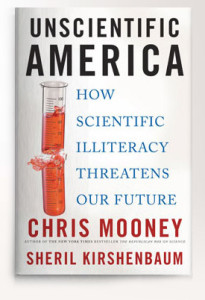Unscientific America
Written by Ashley Kelmore, Posted in Reviews
I should know better than to ever go into Powell’s without a firm agreement with myself that I will NOT buy any books that aren’t already on my Goodreads list. I mean, I’ve got 138 waiting for me – do I REALLY need to walk up and down the aisles of this massive indie bookstore, pulling off books that catch my eye?
Yes, yes I do. Unfortunately, I wish I hadn’t picked up this one.
Subtitled “How Scientific Illiteracy Threatens Our Future,” Mooney and Kirshenbaum’s book purports to explore why the lack of interest in or understanding of science is a threat to the U.S. While I appreciate the sentiment, there were a few negative things that really stood out to me as I read this book, resulting in a pretty low rating.
First, this book was published in 2009, and spends a good part discussing how scientists need to be better versed in how to discuss their findings and research with the media. Better communications training for all scientists is one of their main solutions to the problem referenced in the title, and overall it’s a good one. They point to Carl Sagan as a great scientist who the average person trusted and was interested in learning from; they also point out that he was essentially shunned by “serious” scientists. That’s a problem and needs to be fixed. However, one of the author’s biggest concerns is that we don’t have anyone like that these days.
Say what? Has he never heard of Neil deGrasse Tyson? That man is amazing. He got The Daily Show to (for the day at least) fix their opening credits so the world spins the right way. He got James Cameron to FIX THE SKY when he released the anniversary print of Titanic. This is a man people know, a man who is trying to bridge the unnecessary gap between science and policy, and he’s not even mentioned in the book. That alone gives me pause.
Second, the book has a disturbing chapter called “The New Atheists” that seeks to vilify PZ Meyers, Sam Harris and Richard Dawkins. Now, I don’t know much about Meyers, and I know that Sam Harris seems to be EXTREMELY islamophobic, and Richard Dawkins seems to be quite misogynistic. However, those were the issues these authors had. They attempt to make the case that atheists like them, who suggest that religion today is incompatible with reason, are making the situation worse. I actually get the argument they are trying to make, but they make it so poorly that it’s a bit challenging to get on their side.
Additionally, while I see they have a larger goal in mind, they also seem to be doing the ‘give both sides equal time” thing they eviscerate just a few chapters earlier when discussing climate change. As an atheist (of the ‘there’s no evidence for a diving being now but if you gave me some obviously I’d change my mind’ variety) I am clearly more prone to sensitivity around discussions of this nature, so it is possible that I am either misreading that section or just disagree, but either way it left me with a pretty bad taste in my mouth.
Finally, while the title was clear enough to me that this was about the specific problem of science literacy in America, the nationalist undertones were ever-present and unsettling. I’d like to see the discussion about why it’s important for people to understand science and find it interesting from a policy perspective without ending the chapter with “BECAUSE AMERICA MUST BE NUMBER ONE!!!!1!1!!” I take issue with the U.S. not fostering financial support around issues like climate change, but not because we are the best yay U.S.A.! There seem to be constant appeals to that competitive, egotistical spirit in a lot of the promotion of the STEM areas (science, technology, engineering and math), often to the detriment of the humanities, which ironically these authors correctly point out are a necessary part of even science education. A focus on why this is a problem in our country without the ‘because WIN’ argument would be refreshing.
I appreciate (to a degree) what these authors were going for, but I think they missed the mark. The book was certainly an easy read (and very short, and only 130 pages of text with an additional 100 or so pages of references), and well written, but the arguments left me wanting something better.

